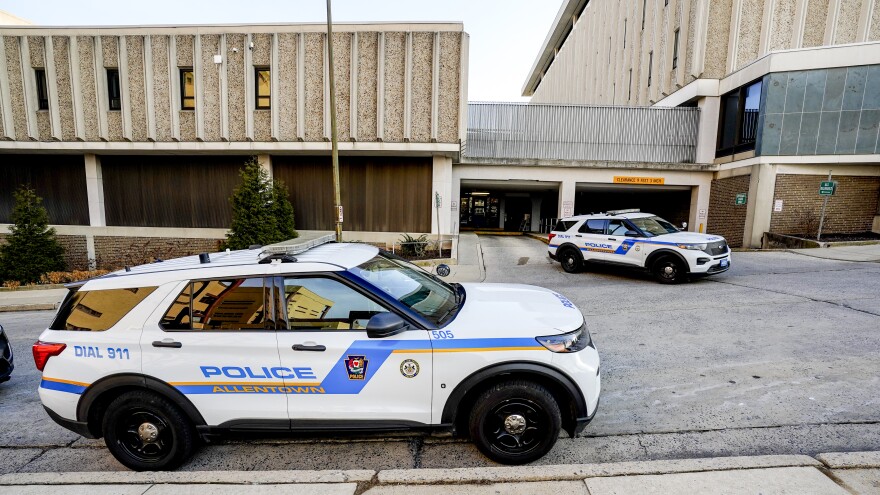ALLENTOWN, Pa. — Supporters of a program that would send "mobile community response teams" instead of police to some 911 calls got less than 45 minutes Tuesday to make their case to Allentown City Council members, who are running out of time to vote on the proposal.
A group of residents submitted more than 3,800 signatures this spring, calling for Allentown officials to launch a one-year alternative first-response pilot program in Allentown.
- Several supporters detailed a pilot program to dispatch EMTs and mental health professionals to some 911 calls in Allentown
- Allentown City Council members said they plan to hear from opponents of the proposal Thursday before voting
- The pilot program would be placed on November ballots if council members do not approve it this week
That almost doubled the city’s requirement of 2,000 signatures to put an initiative or referendum in front of Allentown City Council and, potentially, the ballot.
City officials certified those signatures in April, starting a 60-day clock for council to consider the proposal.
“We certainly could have used more than 45 minutes."Imogen Wirth, petition organizer
Council introduced the program as a proposed ordinance at its May 3 meeting, at which Mayor Matt Tuerk, Police Chief Charles Roca and several residents said they do not support it.
The ordinance says the one-year pilot program would cost about $4 million.
‘Could have used more’ time
Council’s first special meeting to learn more about the proposal was scheduled for a month later, June 7, but that was postponed because “intense smoke” from Canadian wildfires was covering much of the region.
Members rescheduled the special meeting for 5:30 p.m. Tuesday, giving supporters just three-quarters of an hour to speak about the proposal and its merits before a committee meeting at 6:15 p.m.
The special meeting then started a few minutes late, further limiting their time.
Imogen Wirth, a Pennsylvania Working Families Party organizer who helped lead the signature-gathering effort, said she thought supporters started to “show the full scope” of the program Tuesday.
But “we certainly could have used more than 45 minutes,” she said.
Supporters faced “significant hurdles,” including several presenters who could not join for the rescheduled meeting, Wirth said.
“Regardless, our speakers were effective and powerful in providing their testimony,” she said.
'More time to talk' to voters
City Council must vote before this weekend or the pilot-program proposal will go to voters in the fall. City Clerk Mike Hanlon said the 60-day window ends Sunday.
Council plans to vote Thursday after hearing from residents who oppose the project, members said Tuesday. That meeting starts at 6:30 p.m. Thursday.
“That’s more than the amount of voters that came out for many of the council members’ primaries."Imogen Wirth, speaking about the 3,800 people who signed petitions
The proposal also will be on November general election ballots if council votes it down before the 60-day window closes, under city ordinances.
Wirth said she's hopeful council members will adopt the program Thursday, but “likely not, based on the comments” at the May 3 meeting from council members, Tuerk and Roca.
Supporters are ready to take the conversation to Allentown residents, Wirth said.
Many who were unsure about signing a petition for the program were supportive after a short conversation with organizers, she said.
“If we need to go through November, I think that's going to give us more time to talk to more people and to really just engage with people on these issues,” Wirth said.
She encouraged Allentown residents to reach out to the “team of organizers and experts and community leaders and, just, regular citizens” to learn more about the proposed pilot program.
Supporters are confident the measure will pass as a ballot referendum after collecting almost 4,000 petition signatures.
“That’s more than the amount of voters that came out for many of the council members’ primaries,” Wirth said.
Mobile community response teams
The petition calls for Allentown officials to create "mobile community response teams” for issues that “should not and cannot be adequately addressed by police.”
Teams would consist of an emergency medical services professional and a mental health specialist, according to the proposed ordinance.
They would be dispatched to calls involving mental and behavioral health, substance use, welfare checks and quality-of-life complaints — including disputes between families or neighbors and calls about unhoused or suspicious people, the proposed ordinance says.
EMTs and mental health professionals would “arrive without armed law enforcement” and be required to “only request law enforcement back-up as a last resort” after trying to de-escalate the situation, the ordinance says.
'Irresponsible' spending
Allentown police work with community intervention specialists from Pinebrook Family Answers to run a mental health liaison program, Chief Charles Roca said last month.
Specialists respond to calls involving mental health issues where police aren't required, and they work to connect residents with services they need, he said.
Dr. Bill Vogler, chief executive officer of Pinebrook Family Answers, told council he shares a lot of the same goals as the pilot program.
But it would be "irresponsible" for the city to spend $4 million on a pilot program for mental health responders “when we already have systems in place that can achieve those goals," he said.


